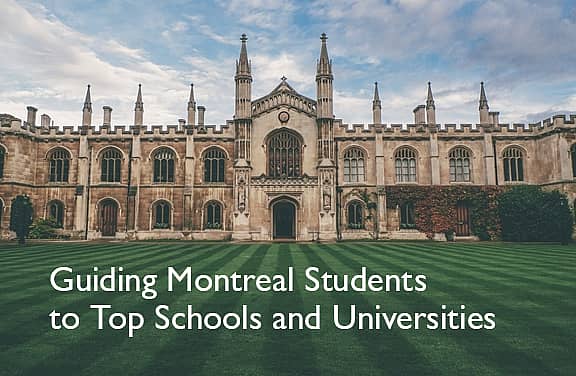Bonjour, et bienvenue à Montréal.
“Hello and welcome to Montreal.”
As a French teacher for 20 years in prep schools, I used to bring my students up to visit this vibrant city, a diverse québecois blend containing elements of America, Canada and France. And this past decade, as an educational consultant, I’ve worked with many students wanting to ‘come south of the border’ to American prep schools and universities. Why do so many Montreal families look down here? Because the prep schools offer a wonderfully holistic 24/7 environment for growth, and the universities offer the flexibility of the liberal arts – how many teenagers really know exactly what they want to do?
What’s neat is that our Montreal students bring not only a bilingual base but a bicultural perspective that’s welcomed by American educational institutions looking for global citizens as they seek to encourage a more diverse international student population. So much of our work focuses on highlighting our Montreal kids’ diversity on applications and in essays – and to find the schools and colleges seeking this type of globally-aware student. Certain large, urban schools – like NYU – are overly flooded with international applicants, while many of the Little Ivies – Bowdoin and Wesleyan jump to mind – are actively recruiting this type of candidate.
But what’s tough coming from Montreal is that this diversity of cultures also means students come bearing an odd, hybrid curriculum– I’ve even heard the term “bastardized curriculum.” Many of our students bemoan the requirement of taking Quebec history en français, for example. And in Québec high school ends after 11th grade, meaning most of our conversations pivot around which options are best after 11th grade in order to gain entrance to an American university (rather than stay home and attend McGill, which is, by the way, a super university):
- Should I continue with one or two years of the post-secondary school cégep, and if so, should it be Marianopolis or Dawson?
- Should I come down to an American prep school for a year or two?
- Should I take the pre-university program such as Lower Canadian College’s US-focused program for 12th grade?
We’ve worked with “all of the above.” One recent student – let’s call him Kevin – interviewed for prep school, but since a concussion had ended his hockey career, decided to do one year of cégep instead. Since Kevin was shooting high, and he needed an extra year or extracurriculars and test prep, we decided after a while that he would stay for the second year at Marianopolis. His patience paid off: He’s starting at Wharton this fall.
Cindy (name changed…), meanwhile, came to us from the LCC Pre-University program, so completed that single year program. We partnered with LCC, and she leveraged an Early Decision option and cranked out some beautiful essays and got in early to George Washington in DC.
As for Paul, he repeated 11th grade at a top prep school – even though he was a very strong student – and the extra year allowed him to shine athletically and personally. He was voted president of his class and went on to Princeton.
So which route is best? That’s for us to coach you on! And even though the Bruins and the Canadiens are rivals, we love working with our friends from Montreal. We visit once or twice a year and meet students either at the Sofitel, or at their schools or homes.
One final tip: start early! We get a handful of Canadian students each summer looking to start the university process just before entering their final year of schooling. It’s best to craft a long-range plan two or three years in advance if possible – though we still do a number of fast-paced university applications over the summer and fall…
A bientôt! See you soon!

